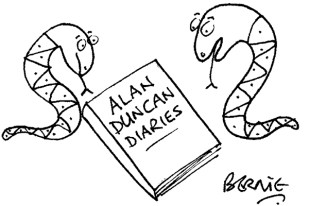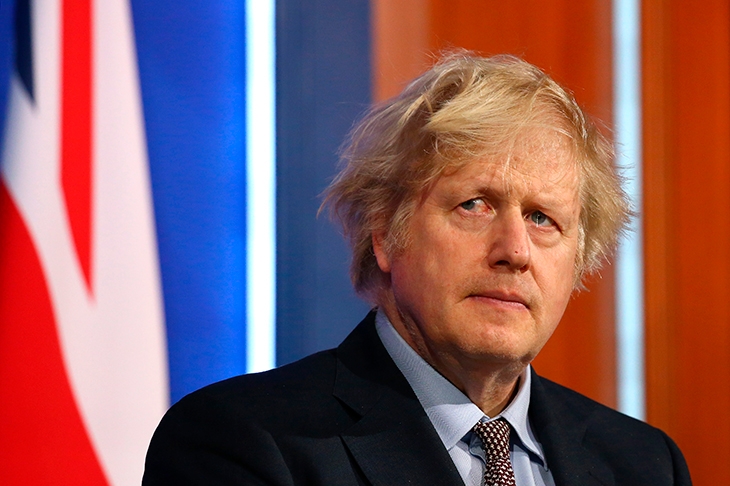No prime minister wants to be dependent on the opposition to get the government’s business through the House of Commons. But it is likely that Boris Johnson will be in this position when it comes to ‘Covid status certificates’, other-wise known as domestic vaccine passports. More than 40 Tory MPs have already signed a pledge to oppose them, and the government’s majority is 80. ‘It is just down to Starmer. If he whips against, Boris will lose,’ says one of the leaders of the Tory rebellion.
The policy has hit a nerve in the Conservative party. The view in government is that these MPs are unlikely to change their minds. They won’t be assuaged by promises to limit the scheme to mass events or anything like that. Tory opponents of Covid status certificates see them as a step towards identity cards and a shift in the balance of power between the individual and the state. The suspicion that certificates will be introduced to increase take-up of the vaccine is only boosting hostility to them.
In truth, some Tory MPs have long been uneasy with the government’s response to Covid. The more libertarian wing of the party has worried about the effects on civil liberties of the various restrictions. The size of the rebellions has waxed and waned depending on the situation; 53 Tory MPs voted against the tiers system at the start of December, but in January, with the Kentish variant raging, only 12 opposed the new national lockdown. In the relative calm of last month, 35 Tory MPs voted against the six-month extension of the Coronavirus Act. If the number of Covid cases continues to decline, it is safe to assume that the Tory rebellion against vaccine certificates will grow.

Until now, the Tory dissenters have had little leverage. Labour has either backed the government or abstained, rendering these Tory rebellions of academic interest. But Labour appears to be preparing to oppose the government on Covid status certificates. Keir Starmer has called the idea of domestic passports ‘un-British’ and Labour have said they would vote against the government’s current proposals. It is worth noting, though, that the government doesn’t currently have a proposal — those close to the process claim that they need to see the data from the trial events before presenting detailed plans — and neither Starmer nor Jonathan Ashworth, the shadow health secretary, has ruled them out in all circumstances.
To many on the Tory benches the puzzle is why the government is so keen on the idea, given the high take-up rate of the vaccine (the Office for National Statistics suggests that more than 90 per cent of the population want to get vaccinated), the evidence of the vaccine’s real-world effectiveness and Johnson’s own previous opposition to identity cards. So what is the explanation?
One factor is that the past year has made nearly everyone in government more cautious. ‘The lesson learned from this pandemic is that if you move too fast, you let the virus rip again,’ says one figure involved with Covid policy from the beginning. This is why the government has said that disappointing data can slow the reopening of society and the economy, but better-than-expected data can’t speed it up.
Israel’s success is deeply influential. It has vaccinated more quickly than any other western country and its successful reopening has used a ‘green pass’, available to anyone who has been vaccinated or has recovered from the virus (see Anshel Pfeffer’s article). The pass is required for indoor dining, and to attend cultural, sports and religious gatherings with large crowds. Many in Whitehall think the pass has been key to Israel’s success; if it has shown a way out of the Covid quicksand, the argument goes, why not follow it? In a lesson learned from a glitch in the Israeli system, it is unlikely that children will be required to have any kind of certificate to accompany their parents.
The choice is between venues effectively being open with these conditions in place, or shut
Given the caution, it is hard to believe nightclubs would be allowed to open on the evening of 21 June without social distancing in place, and socially distanced nightclubs aren’t viable. The thinking is that a scheme for ensuring everyone present has either been vaccinated (I understand it is probable that only a single dose would be required), has natural immunity or has received a negative test would be a way of reopening these places. This explains why ministers see certification so differently. Tory backbench rebels think the choice is between having the checks and a return to normality; those in government, however, believe the choice is between venues effectively being open with these conditions in place, or shut.
There is also the issue of what the government’s scientific advisers say. It is clear from the Sage papers that the scientists expect another wave of the virus once number restrictions are lifted in June, and they want to maintain some kind of social distancing regime into next year. Ministers decide and advisers advise, but any prime minister who pressed on with a reopening plan that his scientific advisers thought unwise would be very politically exposed. So if the government wants to end social distancing, it might need some other prophylactic measure: and Covid status certificates are the obvious option.
Finally, there is the fact that being in office changes how people view state power. In his conference speech in October, Johnson included digital IDs as part of his upbeat vision of what Britain would look like in 2030. Before he became prime minister, it is hard to imagine he would have regarded them as one of the glories of the future.
What happens with Covid certificates will, in large part, depend on what the opposition does. But considering the worries among scientists about a spike in cases as restrictions ease, it is hard to imagine Labour opposing them wholesale: would they really be against passes being used for big pop concerts and sporting events? This means they are still likely to be introduced in some form. Then there is the fact that many figures in Whitehall fear a seasonal resurgence of the virus come the autumn. The vaccines mean that deaths would probably remain low, but cases would go up and hospitalisations could put pressure on the NHS. In such circumstances, Covid certificates might be the way to allow mass events to continue. What is certain is that Boris Johnson has his work cut out to persuade his own MPs of the merits of his case.







Comments